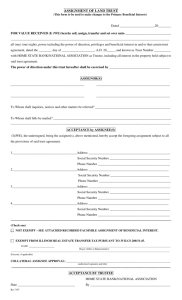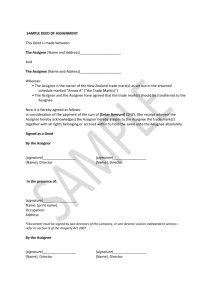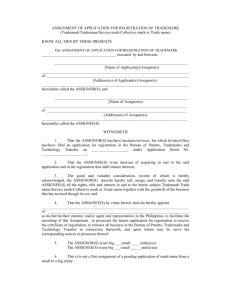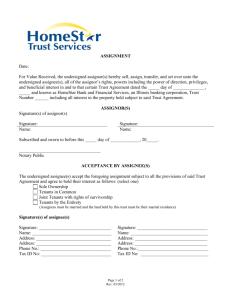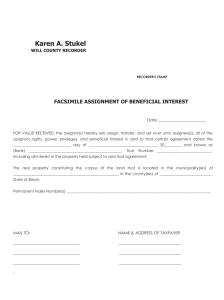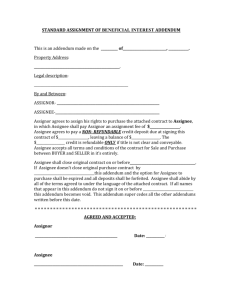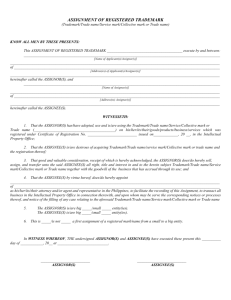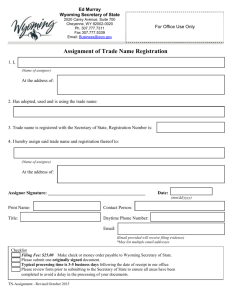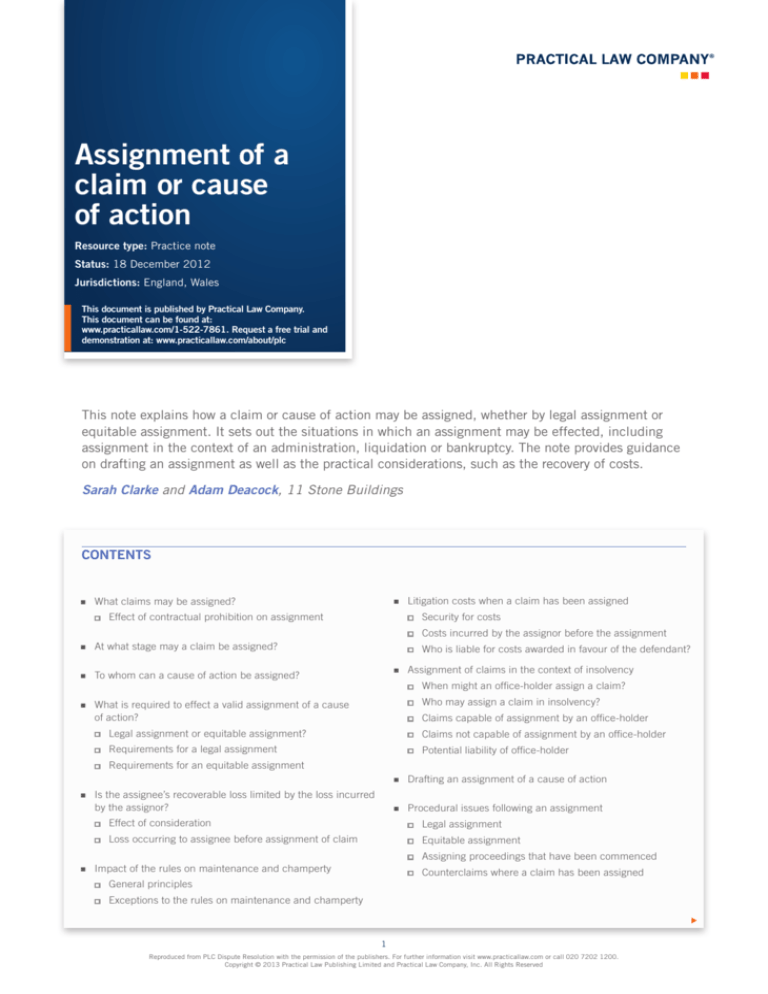
Assignment of a
claim or cause
of action
Resource type: Practice note
Status: 18 December 2012
Jurisdictions: England, Wales
This document is published by Practical Law Company.
This document can be found at:
www.practicallaw.com/1-522-7861. Request a free trial and
demonstration at: www.practicallaw.com/about/plc
This note explains how a claim or cause of action may be assigned, whether by legal assignment or
equitable assignment. It sets out the situations in which an assignment may be effected, including
assignment in the context of an administration, liquidation or bankruptcy. The note provides guidance
on drafting an assignment as well as the practical considerations, such as the recovery of costs.
Sarah Clarke and Adam Deacock, 11 Stone Buildings
Contents
n What
n Litigation
claims may be assigned?
Effect
of contractual prohibition on assignment
n At
what stage may a claim be assigned?
n To
whom can a cause of action be assigned?
is required to effect a valid assignment of a cause
of action?
Legal
Requirements
for a legal assignment
Requirements
for an equitable assignment
Security
Costs
Who
for costs
incurred by the assignor before the assignment
is liable for costs awarded in favour of the defendant?
n Assignment
n W
hat
costs when a claim has been assigned
assignment or equitable assignment?
When
Who
might an office-holder assign a claim?
Claims
capable of assignment by an office-holder
Claims
not capable of assignment by an office-holder
Potential
may assign a claim in insolvency?
n Drafting
the assignee’s recoverable loss limited by the loss incurred
by the assignor?
of claims in the context of insolvency
liability of office-holder
an assignment of a cause of action
n I
s
Effect
Loss
n Impact
n Procedural
of consideration
occurring to assignee before assignment of claim
of the rules on maintenance and champerty
General
Exceptions
issues following an assignment
Legal
assignment
Equitable
assignment
Assigning
proceedings that have been commenced
Counterclaims
where a claim has been assigned
principles
to the rules on maintenance and champerty
1
Reproduced from PLC Dispute Resolution with the permission of the publishers. For further information visit www.practicallaw.com or call 020 7202 1200.
Copyright © 2013 Practical Law Publishing Limited and Practical Law Company, Inc. All Rights Reserved
Assignment of a claim or cause of action
An assignment is the transfer of a right from one party to another. A cause of action by which a party may be able to enforce a right is a
chose in action and, in principle, is capable of assignment. This note considers how a cause of action may be assigned and highlights
the practical issues that may arise on and after an assignment.
Examples of the situations where a party may wish to assign a cause of action include:
n O
n
transfer of a contract or other property to which the cause of action relates. For example, when a property has been sold, the buyer
may take an assignment of a right to sue the builder for any defects.
n I
nsolvency
of the claimant. In general terms, the office-holder appointed over an insolvent company or individual bankrupt has a
duty to realise the value in the assets, including any causes of action. In some circumstances, this may be best achieved by an
assignment.
n Corporate
n Group
mergers, acquisitions or reorganisation.
litigation or class actions.
For more detail about the assignment of contracts, see Practice note, Contracts: assignment and Standard document, Deed of
assignment of contract.
Assignment of insurance policies is outside the scope of this note, see Practice note, Security assignment of contractual rights.
What claims may be assigned?
The starting point is that a cause of action itself (often referred to as a “bare right to litigate”) may not be assigned as assignment would
offend the rules on maintenance and champerty (see General principles). For example, the court has held that the assignment of a bare
cause of action in tort for personal injury was void as it was contrary to public policy because the assignee had no legitimate interest in
the claim (Simpson v Norfolk & Norwich University Hospital NHS Trust [2011] EWCA Civ 1149). However, this principle is subject
to the following exceptions:
n It
is capable of being overridden by statute as in the case of liquidation (see Insolvency exception).
n A
n
assignment of a cause of action may be effected as part of a transfer of property to which the cause of action relates, for example a
debt (which is effectively both property and a cause action itself) or the transfer of a lease which may carry with it the right to existing
arrears of rent.
n I
t may
be possible to assign the proceeds of a cause of action. This would take effect as an agreement to assign future property
(Re Oasis Merchandising Services Ltd [1995] 2 BCLC 493 at page 498).
In addition, there are particular categories of cause of action that may not be capable of assignment, as follows:
n F
or
reasons of statutory interpretation and policy, claims that exist in an insolvency process and may only be pursued by the
insolvency practitioner appointed in respect of the company or individual. These claims include preference claims and wrongful
trading under the Insolvency Act 1986 (IA 1986). For more detail, see Assignment of claims in the context of insolvency.
n C
laims
arising under an agreement containing a contractual restriction (see Effect of contractual prohibition on assignment).
n A
claim that does not yet exist (such as a future claim). However, an attempt to assign a future cause in action may take effect in
equity as a contract to assign (Re Clarke, Coombe v Carter (1887) 36 Ch D 348).
n A
claim that no longer exists, for example, a claim against one defendant where the liability is a joint liability and has been extinguished
by payment by a co-defendant (Crooks v Newdigate Properties Ltd and others [2009] EWCA Civ 283).
Effect of contractual prohibition on assignment
A contract may contain an express non-assignment provision. A non-assignment provision cannot prevent assignment by operation
of law, and any assignment that takes place will be effective as between assignor and assignee. However, the provision will generally
prevent a purported assignment from being effective as against the non-assigning party, if clearly drafted (Linden Gardens Trust Ltd v
Lenesta Sludge Disposals Ltd and others [1994] 1 AC 85). See Practice Note, Contracts: assignment: Non-assignment provisions.
An effective non-assignment clause which prevents a party assigning the benefit of a contract will also prevent that party assigning a
claim arising under the contract. A contract between X and Y which prevents X assigning the benefit of the contract but leaves Y free to
assign, will have a similar effect on assignment of causes of action under the contract: Y will be able to assign, X will not. For the effect
of such an assignment on rights of set-off, see Counterclaims where a claim has been assigned.
2
Reproduced from PLC Dispute Resolution with the permission of the publishers. For further information visit www.practicallaw.com or call 020 7202 1200.
Copyright © 2013 Practical Law Publishing Limited and Practical Law Company, Inc. All Rights Reserved
At what stage may a claim be assigned?
A claim may be assigned either before or after proceedings have been issued. Where proceedings have been issued, an assignment is
likely to give rise to procedural complications which will need to be addressed (see Procedural issues following an assignment).
If judgment has been given, the assignee may seek to enforce the judgment, for example, by a process of enforcement in the county
court or a third party debt order (Goodman v Robinson Brown Janson & Co, Garnishees (1886) 18 QBD 332).
Where enforcement proceedings have already commenced before the assignment (for example, if a charging order has been
granted), it appears it may be possible for the assignee to seek substitution pursuant to CPR 19 so that he may take further steps in the
proceedings (for example, obtaining an order for sale).
If it is intended that the benefit of any existing order be assigned then express provision should be made in the assignment.
A claim that has been referred to arbitration may, in principle, be assigned. Further, if a contract containing an arbitration clause is
assigned, the assignee may be bound by the arbitration clause if it seeks to enforce the assigned contractual rights. For more detail, see
Practice note, When does an arbitration agreement bind a third party in English law?
To whom can a cause of action be assigned?
Examples of people who have taken assignments of causes of action include:
n The
defendant to the claim (see Faryab v S&P (unreported), 2000).
n A
shareholder of the claimant or potential claimant (Massai Aviation Services and another v Attorney General and another [2007]
UKPC 12; see Legal update, Assignment of cause of action to shareholder not champertous).
n A
creditor of an insolvent claimant company.
What is required to effect a valid assignment of a cause of action?
Legal assignment or equitable assignment?
There is a distinction between a legal and an equitable assignment:
assignment (also known as a statutory assignment) is an assignment that meets the requirements set out in section 136 of
the Law of Property Act 1925 (LPA 1925). Following a legal assignment, only the assignee can pursue the claim and the assignee
is regarded as being the sole owner of the property assigned.
n A
legal
n Any
other effective assignment must constitute an equitable assignment.
For more detail, see Practice note, Contracts: assignment.
Requirements for a legal assignment
The requirements for a legal assignment under section 136 of the LPA 1925 can be summarised as follows:
n The
assignment must be absolute (unconditional).
n The
assignment must not purport to be by way of charge only.
n The
rights to be assigned must be wholly ascertainable and must not relate to only part of a debt or other legal chose in action.
n The
assignment must be in writing and signed by the assignor.
n The
other party or parties to the claim must be given notice of the assignment.
There is no prescribed time limit for notice to be given, but the assignment only operates against a defendant or respondent from the
date that party receives the notice. Therefore, notice must be given before the assignee issues any claim, otherwise the assignee would
only be able to take action on an equitable assignment basis, that is, by joining the assignor to the action.
For more detail, see Practice note, Contracts: assignment: Types of assignment.
3
Reproduced from PLC Dispute Resolution with the permission of the publishers. For further information visit www.practicallaw.com or call 020 7202 1200.
Copyright © 2013 Practical Law Publishing Limited and Practical Law Company, Inc. All Rights Reserved
Assignment of a claim or cause of action
Requirements for an equitable assignment
An equitable assignment may mean one of two things:
n An
assignment of existing rights with immediate effect (“an immediate equitable assignment”).
n An
agreement to assign property that is specifically enforceable in equity.
An immediate equitable assignment may be made in one of two ways:
n The
assignor can inform the assignee that he transfers a right or rights to him.
n The
assignor can instruct the respondent or defendant to discharge their obligation to the assignee instead of the assignor.
In Finlan and another v Eyton Morris Winfield and another [2007] EWHC 914 (Ch), Blackburn J said there must be “some outward
expression by the assignor of his intention to make an immediate disposition of the subject matter of the assignment”. See Legal update,
Court allows amendment to plead post-claim form assignment.
An immediate equitable assignment does not generally require consideration. However, an agreement to assign property does require
consideration because equity does not perfect an imperfect gift. It is also said that an assignment by way of charge only will require
consideration because it requires the Court’s assistance (Re Earl of Lucan (1890) 45 ChD 470), although the reasoning is hard to follow.
An assignment of a future cause of action, or an assignment of an existing cause of action intended to take place in the future takes
effect in equity as a specifically enforceable contract to assign and accordingly requires consideration (Re Oasis Merchandising Services
Ltd; Ward v Aitken and others [1995] 2 BCLC 493 at paragraph 498).
Although notice of assignment to the debtor or defendant is not strictly necessary to perfect an equitable assignment as between
assignor and assignee, it is always advisable in order to ensure that the debtor or defendant does not settle with the assignor and to
ensure priorities over any other assignee.
For more detail, see Practice note, Contracts: assignment: Types of assignment.
Is the assignee’s recoverable loss limited by the loss incurred by the assignor?
Effect of consideration
The fact that consideration is paid to the assignor, does not extinguish the loss suffered so as to prevent the assignee pursuing a claim
to recover damages. In Linden Gardens Trust Ltd v Lenesta Sludge Disposals Ltd [1992] 57 BLR 57, the Court of Appeal considered
whether an assignment of a building for full value meant that the assignor had suffered no loss. If that was the case, then the assignee
could not recover loss because it was asserting the assignor’s cause of action. The only limitation, as a matter of quantum, was that
the assignee could recover no more than the assignor could have recovered had there been no assignment. (The decision in Linden
Gardens on the assignability of a cause of action was overturned by the House of Lords, but the Court of Appeal’s decision on this point
remains authoritative (see Loss occurring to assignee before assignment of claim).
The court has confirmed that the same principle applies where there is no or only nominal consideration for an assignment. In Pegasus v
Ernst & Young [2012] EWHC 738 (Ch), Pegasus had issued proceedings for negligence against the defendant accountants in connection
with tax advice. After Pegasus went into liquidation, it transferred substantially all of its assets to a third party (IHUK). The transfer
included an assignment of the cause of action for a nominal consideration.
The High Court held that IHUK could be substituted as claimant in the proceedings. Pegasus could still be said to have suffered a loss,
otherwise the losses that had previously existed would have disappeared into a legal “black hole”. Where a wrong had been committed in
relation to property, and loss was capable of arising as a result, the fact of an assignment did not mean that the assignor could no longer
be said to have suffered loss. This was the case even if the assignment was gratuitous or for part value (GUS Property Management Ltd
v Littlewoods Mail Order Stores Ltd [1982] SC (HL) 157). See Legal update, Assignment of cause of action for nominal sum no bar to
recovery of consequential losses (High Court).
Loss occurring to assignee before assignment of claim
Technotrade v Larkstore Ltd [2006] EWCA Civ 1079 concerned a negligent site survey. The seller of a site sold the site to the buyer.
After the purchase, there was a landslip that caused loss, following which the benefit of a site survey report provided to the seller was
assigned to the buyer. The buyer relied on the report and began proceedings for damages against the defendant. The defendant had
submitted that no loss had occurred to the assignor or buyer as at the date of the assignment, so the seller had no more than a claim
for nominal damages. The buyer could not claim more than the seller could have claimed, and, was also confined to nominal damages.
The Court of Appeal rejected this argument. Mummery LJ’s judgment states:
4
Reproduced from PLC Dispute Resolution with the permission of the publishers. For further information visit www.practicallaw.com or call 020 7202 1200.
Copyright © 2013 Practical Law Publishing Limited and Practical Law Company, Inc. All Rights Reserved
“What was assigned ... was a cause of action for breach of contract against Technotrade and legal remedies for it. It was
not an assignment of ‘a loss’ ... The assignment included the remedy in damages for the cause of action. The remedy in
damages for breach of contract is not, in principle, limited to the loss suffered as at the date of the accrual of the cause of
action or as at any particular point of time thereafter.”
(Paragraph 41, Technotrade.)
The Court of Appeal also affirmed the authority of the Court of Appeal decision in Linden Garden (as referred to in Effect of consideration)
(paragraph 52, Technotrade).
For more detail on the judgment, see Legal update, Assigned cause of action did not leave a gap in liability. For further guidance, see
Practice note, No loss and assignment: the development of the common law in the construction context.
Impact of the rules on maintenance and champerty
General principles
Historically, English law refused to recognise arrangements whereby litigation was funded or “maintained” by third parties who had no
legitimate interest in the subject matter of the litigation. Maintenance is directed against “wanton and officious intermeddling with the
disputes of others” (British Cash & Parcel Conveyors Ltd v Lawson Store Service Co Ltd [1908] 1 KB 1006). The principle extended to
assignments of causes of action to third parties, and “champertous” agreements (under which a third party would maintain an action in
return for a share of the spoils of litigation).
A cause of action assigned as a consequence of a transfer of a property (such as a debt) with which the cause of action is closely related,
will not offend the rules on maintenance and champerty provided the recipient obtains a genuine commercial interest in the subject of
the litigation (Re Oasis Merchandising Services Ltd; Ward v Aitken and others [1995] 2 BCLC 493). For examples of what constitutes a
genuine commercial interest, see Genuine commercial interest.
An assignment of the proceeds of a claim in which judgment has not yet been given will not offend the rules on maintenance and
champerty provided the assignment does not confer any right to interfere in the litigation (Glegg v Bromley [1912] 3 KB 474 at page
490, Re Oasis Merchandising Services Ltd; at page 498). However, an assignment of the bare cause of action so that that proceedings
may be brought in the name of the assignee will generally be contrary to public policy (Trendtex Trading v Credit Suisse [1982] AC 679).
For a more detailed exploration of the rules on maintenance and champerty, see Practice note, Champerty, maintenance and funding.
Exceptions to the rules on maintenance and champerty
Insolvency exception
Various provisions of the IA 1986 authorise office-holders to assign a cause of action that was vested in an insolvent company or
individual at the onset of the insolvency. These provisions operate as a statutory exception to the rules on maintenance and champerty
(Norglen Ltd v Reeds Rains Prudential Ltd–183, [1999] 2 AC 1 at pages 11–12). See Assignment of claims in the context of insolvency.
Genuine commercial interest
An assignment will not offend the rule against maintenance and champerty if the assignee has a genuine commercial interest in the
litigation (Re Oasis Merchandising). Cases where the court has found such an interest include:
n W
here
a claim was assigned to a company established by shareholders of the assignor (Massai Aviation). In Massai Aviation, the Privy
Council held that there was no basis for holding that only shareholders who were also creditors could take a valid assignment. It was
essential to look at the transaction as a whole and ask whether it was contrary to public policy. Here, it held that there was no “wanton
or officious intermeddling” in another’s litigation. Rather, the original owners had simply retained part of what they owned while
disposing of the rest of the company’s assets. See Legal update, Assignment of cause of action to shareholder not champertous.
n W
here,
following settlement of proceedings against the first defendant, a claimant assigned its claim against the second defendant
to the first defendant (Brownton and others v Edward Moore Inbucon Ltd [1985] 3 All ER). The court held that, although the claims
arose under separate contracts, they concerned the same transaction and the same damage. Therefore, the assignee had a genuine
commercial interest in the proceedings, and the assignment was not contrary to public policy.
5
Reproduced from PLC Dispute Resolution with the permission of the publishers. For further information visit www.practicallaw.com or call 020 7202 1200.
Copyright © 2013 Practical Law Publishing Limited and Practical Law Company, Inc. All Rights Reserved
Assignment of a claim or cause of action
Litigation costs when a claim has been assigned
The general principles relating to the recoverability of civil litigation costs are set out in Practice note, Costs: an overview. This note
considers the particular issues that arise when a cause of action has been assigned.
Security for costs
A defendant to proceedings brought by an assignee of a cause of action may seek security for costs against the assignor if the cause of
action was assigned for the purpose of avoiding the possibility of an adverse costs order (CPR 25.14(2)(a)).
A defendant may also seek security for costs against any person who has obtained an interest in the proceeds of the claim in exchange
for a contribution to the costs of the proceedings (CPR 25.14(2)(b)).
For general principles relating to security for costs, see Practice note, Security for costs: an overview: Applications by defendants
against someone other than claimant.
Costs incurred by the assignor before the assignment
An assignment of a cause of action should include an assignment of any costs incurred by the assignor in the proceedings before
assignment if the parties intend that the assignee should recover these from the defendant. A claim to recover costs is a future claim
and is a claim to future property capable only of equitable assignment (Hambleton v Brown [1917] 2 KB 93). Care needs to be taken
to ensure the recovery of costs is not defeated by the indemnity principle, that is, that a party cannot recover more in costs than he is
liable to pay his own solicitor (Gundry v Sainsbury [1910] 1 KB 645).
There is no general principle that pre-assignment costs will be included within an assignment that does not expressly assign preassignment costs. Unless the parties can establish an implied term on the construction of the specific document, the recovery of preassignment costs will need to be achieved under the general costs regime. Accordingly:
n A
n
assignor may be able to recover from the defendant under the ordinary rules as a party (if joined to proceedings on an equitable
assignment).
n I
f the
assignor wishes to reserve the position to recover costs after the assignee has been substituted in proceedings he should seek
an order reserving such costs to the trial judge in the order substituting the assignee as claimant.
n I
t is
doubtful that an assignee would be able to recover the costs incurred by the assignor in the absence of an express provision.
Accordingly, the assignment should make express provision for those costs and whether the assignee is to retain the benefit of the costs.
Who is liable for costs awarded in favour of the defendant?
The general rule for costs orders is that the unsuccessful party will be ordered to pay the costs of the successful party. However, the
courts may make a different order (CPR 44.3(2)). The courts have discretion to determine by whom and to what extent the costs are
to be paid (section 51(2), Senior Courts Act 1981). This has the effect that the court may award costs against a non-party, including
an assignee or assignor who is not, or has ceased to be, a party to proceedings (Aiden Shipping Co Ltd v Interbulk Ltd (the Vimeria)
[1986] 1 AC 965).
The court may make a costs order against an assignor who was never a party to proceedings if both of the following conditions are met:
n The
proceedings were commenced by the assignee after the assignment.
n T
he
assignment was on terms that caused the assignor to retain an interest in the outcome of the litigation (Hamilton v Official
Receiver [1998] BPIR 602).
Where the assignment occurs after proceedings have been commenced and the assignee adopts the proceedings, the position is
likely to be more complex. At common law, the courts have recognised that when a trustee in bankruptcy adopts and takes steps in
furtherance of proceedings on foot at the commencement of the bankruptcy, a costs order puts himself in the position of a party and a
costs order may be made against him in respect of the whole of the proceedings (Borneman v Wilson (1884) 28 ChD 53). The argument
could be made by analogy that the same would be true of an assignee who adopts existing proceedings.
Both assignee and assignor are potentially liable to an adverse costs order if proceedings on the claim are unsuccessful. The assignee’s
liability may include adverse costs incurred during the period before the assignment. The assignor may still be vulnerable to a costs
order after the assignment on the basis that he was the original party to the claim or as a third party. Although there appears to be no
authority on the point, it is thought likely that the assignor will remain liable for the period prior to substitution; but he will only be liable
for the period after assignment on the same footing as he might have been if he assigned before the claim was commenced (that is, if
he retains an interest in the proceeds). An assignor may wish to bear this in mind when negotiating consideration for the assignment.
He may wish to ensure any assignment includes an indemnity for the adverse costs of proceedings.
6
Reproduced from PLC Dispute Resolution with the permission of the publishers. For further information visit www.practicallaw.com or call 020 7202 1200.
Copyright © 2013 Practical Law Publishing Limited and Practical Law Company, Inc. All Rights Reserved
For a more detailed discussion of the circumstances in which the court will order costs against a non-party, see Practice note, Costs
and non-parties to litigation. The potential liability of an insolvency office-holder is considered in Potential liability of office-holder.
Assignment of claims in the context of insolvency
When might an office-holder assign a claim?
Insolvency procedures (such as administration, liquidation and bankruptcy) involve the appointment of an insolvency office-holder
whose primary duty is to get in the property of the company or individual, and realise the value of that property for the benefit of creditors.
In this context, a cause of action falls within the definition of property (section 436(1), IA 1986).
An office-holder may assign a cause of action because:
n H
e
has insufficient funds to pursue it on behalf of the estate.
n He
does not consider it to be worth pursuing on behalf of the estate in light of the prospects of success or recovery, the factual
complexity or the time required to pursue litigation.
n I
t is
an effective way to realise value for the insolvent estate.
For more detail on the options available to an office-holder, see Practice note, Litigation by insolvent companies: issues to consider
before starting a claim.
In considering whether to assign a claim an office-holder must exercise great circumspection, bearing in mind the consequences to the
other parties. This is particularly the case where a trustee in bankruptcy intends to assign a claim to the bankrupt who is unlikely to have
the means to satisfy adverse costs orders of proceedings (Re Papaloizu [1999] BPIR 106).
It is appropriate for the office-holder to take steps to satisfy himself of the merits of the claim before proceeding with an assignment,
and he may refuse to assign if he is unable to satisfy himself the claim has merit (Cummings v Official Receiver [2002] EWHC 2894).
In liquidation or bankruptcy, a person seeking to take an assignment of a claim can apply for a court order requiring the liquidator
or trustee to assign it (sections 168(4) and 303, IA 1986 respectively) (Hamilton v Official Receiver [1998] BPIR 602). On such an
application, the assignee may be required to indemnify the office-holder for any costs incurred. The court has refused to compel a
trustee in bankruptcy to assign a claim where the proposed assignee could not offer the trustee an indemnity against any liability for
costs (Osborne v Cole [1999] BPIR 251) (see Potential liability of office-holder).
Who may assign a claim in insolvency?
A cause of action may be assigned by:
administrator who acts as agent of the company (paragraph 69, Schedule B1, IA 1986 ) and has the power to sell or dispose of
property of the company (paragraph 60, Schedule B1 and paragraph 2, Schedule 1, IA 1986).
n A
n
n A
liquidator,
who acts agent of the company (Knowles v Scott [1891] 1 Ch 717), if he gives notice of a disposition of any property to
a person connected with the company to the creditors (sections 165 and 167 and paragraph 6, Schedule 4, IA 1986).
n A
trustee
in bankruptcy. The trustee has the power to sell any part of the property comprised in the bankruptcy estate and to make
any arrangement as may be thought expedient with respect to any claim arising out of or incidental to the bankrupt’s estate
(section 314 and paragraph 9 and 9B, Schedule 5, IA 1986).
administrative receiver appointed under a debenture who is deemed to have the powers specified in Schedule 1 to the IA 1986
(that is, the same powers as an administrator) (section 42, IA 1986). For more detail on an administrative receiver’s powers, see
Practice note, Administrative receivership.
n A
n
Claims capable of assignment by an office-holder
An insolvency office-holder can assign the following types of claim:
n Claims
comprised in the company’s property at the date of liquidation (Re Oasis Merchandising).
vested in a bankrupt’s estate under section 306 of the IA 1986. (Note the exception in relation to personal claims identified
in Claims not capable of assignment by an office-holder.)
n C
laims
7
Reproduced from PLC Dispute Resolution with the permission of the publishers. For further information visit www.practicallaw.com or call 020 7202 1200.
Copyright © 2013 Practical Law Publishing Limited and Practical Law Company, Inc. All Rights Reserved
Assignment of a claim or cause of action
n Proceedings
which are already on foot at the date of administration or liquidation (Re Edennote [1995] 2 BCLC 248).
n “
Hybrid
claims” which combine personal damages with a claim relating to the assets in the bankruptcy (Ord v Upton [2000] 2 WLR
755). Hybrid claims vest in the trustee, but any proceeds of the personal claim will be held on trust for the bankrupt. Hybrid claims
may be assigned, but the assignee (if someone other than the bankrupt) will take the claim subject to the bankrupt’s right to a share
of the proceeds.
Claims not capable of assignment by an office-holder
In addition to the general types of claim that are not capable of assignment (see Claims capable of assignment by an office-holder),
an insolvency office-holder may not assign the following:
n O
ffice-holder
claims, that is statutory claims an office-holder is entitled to pursue under the terms of the IA 1986. These include
claims based on avoidance of property dispositions under section 127 and wrongful trading under section 214 of the IA 1986.
Office-holder claims are personal and cannot be assigned (Ruttle Plant Hire Ltd v Secretary of State for Environment, Food and Rural
Affairs (No3) [2008] EWHC 730 (TCC) and Re Oasis Merchandising Services Ltd; Ward v Aitken and others [1995] 2 BCLC 493).
n C
auses
of action which do not vest in trustee, such as a right of action by a bankrupt for damages of a personal nature. This includes
damages “estimated by immediate reference to pain felt by the bankrupt in respect of his body mind or character, and without
immediate reference to his rights of property nature” (Beckham v Drake (1849) 2 HL Cas 579).
n C
laims
under a contract which expressly prohibits the assignment (Ruttle Plant Hire Ltd v Secretary of State for the Environment and
Rural Affairs [2007] EWHC 2870 at paragraph 67).
liquidator’s right to commence or continue proceedings in the name of the company under paragraph 6 of Schedule 4 to IA
1986 (Ruttle Plant Hire). In Ruttle Plant Hire, a liquidator tried to evade a contractual prohibition on the assignment of a cause of
action belonging to the company by relying on the assignment of his right as liquidator to pursue the cause of action (see Legal
update, Does a non-assignment clause survive liquidation?). Presumably this would also apply to the right of an administrator or
administrative receiver to pursue proceeding in the name of the company under paragraph 5 of Schedule 1 to the IA 1986.
n A
Potential liability of office-holder
An office-holder who assigns a cause of action, may be found liable to pay the adverse costs of the defendant to an unsuccessful action
brought by the assignee in the following circumstances:
n W
here
an assignment is for a sum of money such that the insolvent estate retains no interest in the outcome of the proceedings
ordinarily no order for costs will be made where the proceedings are issued after the assignment. It is thought likely that where
such an assignment occurs after the proceedings have been issued, the assignor would remain potentially liable for the costs
before assignment.
n W
here
the assignment is on terms that the insolvent estate has a continuing interest, in the outcome of the proceedings, (for example,
a share of the proceeds of the litigation), there remains the possibility that the office-holder will continue to be potentially liable for
costs incurred after the assignment.
(See Hamilton v Official Receiver [1998] BPIR 602 and Hunt v Harb [2011] EWCA Civ 1239.) (See also Legal update, Adverse cost
risk for trustees in bankruptcy who assign claims (Court of Appeal) and Practice note, Litigation by insolvent companies: issues to
consider before starting a claim: Assignment.)
For a more detailed discussion of when the court will order costs against a non-party, see Practice note, Costs and non-parties to
litigation.
If there is a potential costs liability, an office-holder may be entitled to refuse to assign a cause of action if the proposed assignee cannot
offer an indemnity against any liability for costs (Osborne v Cole [1999] BPIR 251).
There appear to be no reported cases in which a trustee in bankruptcy has been made liable for costs after assignment, although there
are several in which the court has considered the possibility that he might be liable in the contexts of attempts to make him assign.
It is possible that, in an appropriate case, the court may consider ruling in advance on whether the trustee would in fact be liable so as to
permit him to assign safe in the knowledge that he will not be made liable (see Hunt v Harb, although the Court of Appeal was unwilling
to rule as such in that case).
8
Reproduced from PLC Dispute Resolution with the permission of the publishers. For further information visit www.practicallaw.com or call 020 7202 1200.
Copyright © 2013 Practical Law Publishing Limited and Practical Law Company, Inc. All Rights Reserved
Drafting an assignment of a cause of action
Issues to address when drafting any assignment of a claim include:
n I
s
the right to bring the proceedings capable of assignment? (See Ruttle Plant Hire Ltd v Secretary of State for Environment, Food and
Rural Affairs (No 3) [2008] EWHC 730 (TCC).)
n I
t is
common practice to provide for some form of nominal consideration so that the assignment may take effect as an equitable
assignment in the event that it is defective as a legal assignment (see Effect of consideration).
n I
f proceedings
are already on foot, consider what steps will be necessary to resolve the procedural difficulties namely, adding the
assignee as a party to the proceedings as mentioned in Procedural issues following an assignment.
n Indemnities
may need to be included to protect the assignor from adverse costs.
n T
o
what extent will the assignor be expected or entitled to be involved in, or otherwise assist the assignee in the conduct of the
litigation? Include the necessary co-operation or further assurance provision, for example:
n providing
witness statements;
n commenting
n attending
on evidence produced by the other side;
court to give oral evidence;
n assistance
with disclosure; or
n preserving
evidence etc.
For example, see Standard document, Deed of assignment of contract.
n S
pecify
whether the assignment includes the assignee’s right to recover litigation costs incurred pre-assignment.
n A
n
insolvency office-holder should check in each case whether there is a requirement for sanction, for example in bankruptcy where
the consideration for the assignment is deferred (see paragraph 3, Schedule 5, IA 1986).
If drafting an assignment of the right to recover costs or the proceeds of the claim, also include consideration, because an assignment
of this nature is a future claim (that is, the right to the proceeds of the claim if it is successful) (see Re Oasis Merchandising and
What claims may be assigned?).
Procedural issues following an assignment
Legal assignment
Following a valid legal assignment on notice to the defendant:
n The
assignor ceases to have an interest in the action.
n The
assignee is entitled to bring proceedings in his own name.
The particulars of claim should plead the details of the assignment and the date notice was given to the defendant.
Equitable assignment
Where the assignee takes pursuant to an equitable assignment, the assignor should be a party to the proceedings, ideally as co-claimant.
The assignee may be required to indemnify the assignor against costs, if necessary.
Proceedings brought without joining the assignor will not be a nullity, and the defendant may be prepared to waive the requirement to
join the assignor (Central Insurance Co Ltd v Seacalf Shipping Corporation (The Alios) [1983] 2 Lloyd’s Rep 25 and Brandt’s Sons & Co
v Dunlop Rubber Co [1905] AC 454).
Assigning proceedings that have been commenced
The assignment of a cause of action after proceedings have been commenced is likely to cause procedural difficulties.
9
Reproduced from PLC Dispute Resolution with the permission of the publishers. For further information visit www.practicallaw.com or call 020 7202 1200.
Copyright © 2013 Practical Law Publishing Limited and Practical Law Company, Inc. All Rights Reserved
Assignment of a claim or cause of action
The assignee will need to seek to be joined (in the case of an equitable assignment) or substituted (in the case of a legal assignment) as
the claimant and will need to amend the particulars of claim to plead the assignment accordingly.
Although the assignee will not have been entitled to the cause of action at the date of issue, the court has a discretion to permit an
amendment to plead the assignment as a fresh cause of action notwithstanding that it arose after the issue of the proceedings (Hendry
v Chartsearch Ltd [1998] CLC 1382 and Maridive & Oil Services (SAE) and another v CMA Insurance Co (Europe) Ltd [2002] EWCA
Civ 369).
The court may even permit an such an amendment (that is, to plead an assignment that post-dates the commencement of proceedings)
after the relevant limitation period has expired, provided the evidence on which the assignee relies is already substantially in issue
(Finlan v Eyton Morris Winfield). In Finlan, the assignee issued a claim form the day before expiry of the limitation period and hours
before completing a legal deed of assignment. The court held that, when the claim was issued, there had been no assignment, merely
an agreement to assign the claim. Despite this finding, the court was prepared to grant permission to amend the claim enabling the
assignee to plead the assignment. For more detail, see Legal update, Court allows amendment to plead post-claim form assignment.
However, the court may refuse to permit amendment after the expiration of a limitation period where the claim was issued by a party
with full knowledge that they did not, at the time of issue, have standing to bring the claim, in the hope of obtaining an assignment at a
later date (Pickthall v Dickinson LLP [2009] EWHC Civ 543).
Where the assignment takes effect as a legal assignment, it will be necessary for the assignee to seek to be substituted for the assignor
under CPR 19.2(4). Where the assignment takes effect as an equitable assignment, it will be necessary to amend proceedings to join
the assignee under CPR 19.2(2).
The procedure for adding a party to proceedings is considered in more detail in Practice note, Amendments to statements of case.
For guidance on the assignment of a claim during arbitration proceedings, see Practice note, When does an arbitration agreement
bind a third party in English law?.
Counterclaims where a claim has been assigned
An assignee takes a cause of action subject to any rights of set-off that have accrued before notice of assignment. This is the case even
where the set off rights have crystallised in a judgment prior to the notice of assignment (Lawrence v Hayes [1927] 2KB 111).
In practical terms, this means that the assignee cannot be in a better position than the assignor and an assigned debt or other claim
may be severely impaired if the debtor has a claim. Before taking an assignment of a debt the potential assignee would be well advised
to obtain confirmation that there are no cross-claims from the assignor or ideally the debtor.
In the context of insolvency, there is automatic set off of mutual credits, debts or other dealings between a creditor and either a
company in liquidation or bankrupt (rule 4.90, Insolvency Rules 1986 (SI 1986/1925) and section 323, IA 1986 respectively). As a
consequence of the automatic set off, the original claim and cross claim are extinguished and replaced with a claim for the net balance.
The resultant claim for the net balance is itself a chose in action assignable by the office-holder (Stein v Blake [1996] QC 324). For more
detail, see Practice note, Set-off and netting: Insolvency set-off.
10
Reproduced from PLC Dispute Resolution with the permission of the publishers. For further information visit www.practicallaw.com or call 020 7202 1200.
Copyright © 2013 Practical Law Publishing Limited and Practical Law Company, Inc. All Rights Reserved

